
| beginning latest entry |
I woke up this morning and actually felt half-way decent. For some reason, my mind and body have been drifting and floating a lot the past week. I also always seem to forget that sometimes the chemicals just make me feel sort of bad.
Now it is a new year, at least using the arbitrary metrics we adopt. They have meaning, because we say they do! Nice life-lesson in that, I suppose.
Jeez I'm rambling. Still just a little "wifty". This has been a wonderful holiday. 2011! Yikes! 1-11-11! I could not have imagined this. Extrapolate from that... 2012? 2014? 2020? Unimaginable.
Lian and Daniel are battling evil on their computers. Jill's reading,
I'm taking a break from reading and computering. I like this life.
I was the first one awake this morning, very unusual. I took
this picture out our back window:

I've been scoping out restaurants in our apartment area. Tonight I went to a place called 181 Cabrini. The food was quite nice, I had a seared tuna with wasibi and a really tasty arugula salad. As I was eating, a bunch of people showed up and all sat around a group of tables next to me. More people came, and I offered to move over to let them use mine. One of them noticed I was reading my Kindle, and asked how I liked it. It turns out they had a vested interest, because the group that was meeting was a Book Club. They were discussing Paul Harding's book Tinker (Pulitzer prize winner this year). They invited me to join in the discussion, even though I hadn't read the book(!).
Needless to say, I didn't have much to contribute to the conversation, but it was fascinating to sit back and observe. I was in an interesting location, at the 'head' of the table group, but separated by a bit so not really an included part of the gathering. It was a perfect place to watch the interplay of personalities and the unfolding of the discussion. I was a book-club ethnographer. Kind of like going to a really strange movie (maybe My Dinner with Andre from 1981). What a New York thing! I asked a few questions now and then, and they all invited me back. Unfortunately it's on Tuesday evenings, and once classes start I'll be grad-seminaring at that time.
One of the things that struck me was the level of engagement with the book, which was clearly not a fast-read/potboiler kind of text. How does contemporary art-literature able to do this? Why aren't there "music clubs" with a similar intellectual and personal relationship with new music shared by the members? Yikes, maybe I should start one!
It also got me thinking about the situation of my own music in the world. When I returned to the apartment, I decide to take a slight detour and head up to the roof to take in the panorama. It wasn't as cold as recent nights, so I was able to hang out a little and view the world. The scale of it all! It is immense. So many people, so many lives, the scope of consciousness, existence. Where does my music fit in? It doesn't. My audience is one: me. Pretty much that makes me happy.
I don't know how long this will last. Hopefully for awhile. This of course means I need to continue with my current chemicals. It's going to be an interesting semester coming up.
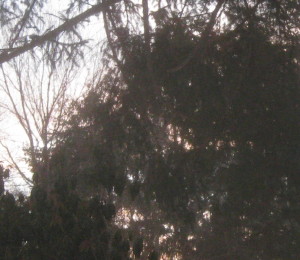
A few random bloggish items: Dave Sulzer/Soldier and I did our happy little "brainwave" show this past Sunday at the Cornelia Street Cafe:


That feeling of peace and wonderment was at odds with the recent events here in our country. Probably fueled by the poisonous rhetoric that passes for "political commentary" these days, an unstable maniac shot at an Arizona Congresswoman, injuring her critically, wounding fourteen other people and killing six. Among those shot dead were a nine-year-old girl and seventy-nine-year-old grandmother.
I don't want to get into my personal 'take' on the politics of fear or the insanity of selling 30-round Glock pistols to disturbed individuals (or in general, for that matter...). I did want to post, however, a speech my father wrote back in 1999. It was published in Vital Speeches of the Day, and the message has an unfortunate relevance today:
I wish the peace I find in a simple place like our back yard
could envelope the earth...


The word for this morning is "home". It really is good to be home. I've spent the last few days in Columbia-Presbyterian Hospital, where I landed after a very strange thing happened on Monday morning. Jill wrote a 'timeline' that describes it best:
As best I can construct the timeline: You woke up and answered emails until about 8:30 when we ate breakfast. You ate well, took your meds, and after breakfast made yourself another espresso while I loaded the dishwasher. That was maybe 9 or 9:15. I had loaded everything, and then looked over and you had a glass of orange juice and your cup of espresso and I asked you to finish up so I could start the dishwasher. You didn't respond. I got closer and you were "asleep" in your chair. I said "Brad" a lot of times, with increasing loudness. I shook your shoulder. Nothing. Daniel came to see what was wrong. You were "asleep" - chin to chest, but sitting up on the chair. At some point I was able to rouse you and you said "bits of things, spinning" and went back to sleep. Daniel looked up Dr. Pearse's number. I called and got an answering service. They had the Dr. on call call me back. Timeline - maybe 9:30 by now? The doctor on call said to call 911. I did. They took the info and made a big deal that we didn't live on Cabrini Avenue, but Cabrini Boulevard. They put me on with the EMT dispatch, who had me try to rouse you again, and you opened your eyes, looked around. But you were not awake. So they said you were not unconscious, but you were unresponsive. Yup, that's right. They said someone would come. I sent Daniel to get dressed, and tell the doorman. I got things ready for us to go to the hospital. Maybe 10am the EMTs came? They talked to you - and you made little sense. You did give your correct social security number, but you didn't know what day it was or who was president. I forget who you said that time - there were so many times you answered variously, Nixon, Reagan, Kennedy, and Lincoln. A lot of questions about what drugs you take, and whether you had been drinking. They had you drink some water - you could swallow OK. You had trouble holding the glass. They tried to get you to stay awake. Maybe 10:30 by the time they got all the information - strapped you in the chair and brought you to the ambulance. Ambulance had trouble getting through the streets with all of the double parking. Gave you oxygen in the ambulance. Daniel and I rode with you. The EMT tested you to see if you had a stroke - that squeeze my hands thing to see if you had one hand stronger than the other. All OK. In the ambulance, you talked about football - the quarterback moving the ball down the field for the first down. You were slurring. Maybe 11am by the time we were at triage in the hospital? They checked for blood sugar. Lots more questions. No answers that made sense. We finally let you sleep. You were able to obey commands, but your speech was very quiet, and we had to get you to repeat things. Couldn't really understand from the context. You told people you felt like a bag of rocks, rubbing together. You said my age was 74. Etc. Around noonish we were at the Area D, bed 14 area. Your blood pressure was fine. Over the course of the afternoon, they did a EKG, hooked you to monitors, took blood, took x-ray, did CT, gave you IV fluids, etc. Daniel went back to the apartment to pack up, and he got something to eat. I read my book. You only started to become more lucid around 4pm.
The good news is that after many many tests (MRI, CAT-scan, EEG, blood-work of all kinds, X-rays, etc.) there is nothing apparently wrong with me. I was fearing a secondary cancer had formed as a brain tumor. The weird news is that they can't find anything wrong with me! All the tests were negative. Except for the fact of my multiple myeloma I have a clean bill of health.
Their best guess is that the episode was somehow triggered by my steroids. The timing is suspicious, I had taken my weekly dose about 45 minutes before I 'fell asleep'. As I have mentioned before in this blog, I'm feeling the effects of the decadron much more strongly than I did in my induction therapy use, even though the dose is much smaller. It is the potentiative effects of the biaxin that is a part of this therapy. Again, good news here: Dr. Pearse had sent over my latest measurements to the oncologist (Dr. Andrew Eisenberg) at Columbia-Presbyterian, and my myeloma stats have dropped dramatically. So at least the drugs are doing their job. In fact. Dr Eisenberg was amazed at how well I seemed to be managing the myeloma, going so far is to call me a 'poster child' for contemporary drug therapies. Sign me up for those posters.
I'm back home now, feeling about as 'normal' as I do anymore, although really tired. A hospital is no place to get actual rest. I'll repeat: It really is good to be home.



The little episode last week seemed perhaps a turning-point. I do believe we have the cancer on-the-run again, the stats are continuing to come down. At my appointment earlier this week, Dr. Pearse and Faiza have said it's ok for me to cut back on the Biaxin (this is what makes the steroids more powerful), so I'm now only taking half the dose I was. We also discussed changing away from the Ambien I take with my weekly Decadron dose, but that probably won't happen until after my neurological consult in a month. Dr. Pearse is reluctant to make too many drastic changes that may interfere with the way things are progressing right now. I completely agree.
Life continues, then, although my existence is a vibrating/lethargic, slightly-nauseous and shifting experience. And it is snowing outside. This is winter.

I could have written: "Another grey day. Feel kind of depressed. Grey." Or I could have written about the hour-plus it took to chip away the ice holding my car fast to the street parking (and the nice two-foot solid ice divider thrown up by the NYC street snowplows). Or I could have written about how my body just feels weird a lot, even with the new drug-dosages. It is better than it was, but I still feel either tired or oddly 'jangly' whenever I'm awake. No repeat of the zombie-state, though. I hope this passes.
What a self-serving blog this is! Whine whine whine, complain complain complain. As I sit and try to exist, at least I've been remarkably productive. The semester is underway -- probably part of the initial overwhelmingness depression I've been feeling -- and I've also released a large batch of software for use:
Things continue. I still feel weird. Dr. Pearse suggested that I consider
changing therapies if it got too bad. I'd prefer to stick with this
"BiRD" therapy for now, since it seems to be working. I'd like to see
if we can put my myeloma into remission again, at least for awhile.
Then time to consider alternatives. At least there are alternatives.
I meant this one to be up on 2/15/2011:
This week we're doing our graduate-application admit decisions. It's always difficult because of the large number of applications. The overall high quality of students has steadily increased, although this year there didn't seem to be any big standouts from the group. Maybe that's an effect from the general increase. In any case, I don't anticipate any real problems in making our choices (and in fact there weren't...).
It's always strange to gain a small window into others' lives, especially in the 'personal statement' where they are asked to write why they want to pursue music composition, come to Columbia, do what they do, etc. Such hopes and dreams! Such future ambitions! I was like that once-upon-a-time; still am but the field of imagination has radically shifted.
Occasionally you encounter a narrative that is so completely different from your own life-experience that it does force you to leave your cocoon of solipsism, at least a little. The 'personal statement' of one of our applicants this year described his passage from one war-torn country into another offering a relative safe-haven. He and a friend were being pursued for the music(!) they did. According to the narrative, gunshots were literally flying overhead, and I believe this report to be true. Our world, oh my. What would I do in a situation like that? I honestly don't know, because I can't even conceive of my life like that. I've been so lucky.
I could probably continue here listing how the pathetic "challenges" I've faced can't measure in comparison to the stories I've heard like this: the tales of our Chinese students who lived through the Cultural Revolution, reports from close friends who had to wade rivers at midnight as children as they fled from one repressive regime or another... but I think the important lesson that I try to keep in mind is that you land at some place through entirely arbitrary circumstances. What you do from that point is the critical, life-determining move.
It hasn't been a pleasant week, and I'm not exactly sure why. I'm taking the same drugs, but I just can't predict from one hour to the next how I will feel. Jangly, then almost feverish, then really tired, than kind-of ok, then 'wifty'... it cycles randomly. I'll have to learn to ride this out. If I go back and read some of my earlier blog entries when I was getting Big Chemo, I do see that this isn't all that different. There was a book I used to read Lian and Daniel when they were much younger with a great title, certainly applicable here: Could Be Worse!.
There is good news from earlier today, though. My stats are still going down, and Dr. Pearse said that if they continued to be low from the labs this visit he wanted to reduce my steroid load by 50%. He's not a fan (for obvious reasons, and some not-so-obvious) of long-term steroid use. This will make a big difference, I think.
I looked up with my eyes barely open, and I saw the IV drip,
the clear plastic tube down into my arm. There was a bag
with very expensive drugs in it, and it had my name on it.
That's where I was, then.
I wish I knew the words that Gasparyan was singing.

But back to the blog, I had forgotten how long these chemo-feelings can last. My initial chemical roller-coaster went on for months and months. Reading through my early entries, I can remember a time like now, and the good news is that I know there will be an endpoint. Of course it may be a very different endpoint than previously, but we tend to think that life will continue as it is, that it will unfold in a predictable way from our present circumstances. This is not true!
In addition to the bodily awareness of my myeloma-situation forced upon me by the drugs, I've also been thinking about cancer a lot lately because I'm reading a remarkable book: The Emperor of All Maladies: A Biography of Cancer by Siddhartha Mukherjee. Dr. Mukherjee is an oncologist at Columbia/Presbyterian (hey! I know that place!), and his book is part history, part critique, part information about contemporary therapies, and a lot of compassion. It was one of those books that was recommended to me, but -- probably because of the title -- I really didn't want to pick up and read all that badly. I'm glad I did, it's absolutely fascinating.
Plus the feeling of the drugs, the drugs. Here I am, wifting away again. I'm heading over to Weill-Cornell shortly for my treatment with Pentamadine to prevent a rare pneumonia. Then home to relax, read, work on a new piece, Damon Holzborn and I are finishing up the iRTcmix software for release, life.
My dad's back surgery last week looks like it is a tremendous success! Lian was able to visit mom and dad last weekend; she was helping to recruit for Amazon at a 'job fair' at Purdue University. Mom's birthday yesterday, HAPPY ONE mom!
Here is something I meant to post here about a week or so ago. It's from that book I finished earlier in the month by Siddhartha Mukherjee, The Emperor of All Maladies. Towards the end of the book, he writes about multiple myeloma:
Now imagine waking at 5:30 AM, the light again a pearly predawn blue/grey. Today you awake in Japan, however. The world has changed. The earth has literally shifted beneath your feet, and the aftershocks keep coming. News reports describe the Japanese populace as "numb and shell-shocked". The photos appearing on web sites seem to get worse and worse. Just as my mind can't contain the mass of individual lives, I cannot imagine the scale of devastation that is being shown.
Thank goodness none of our friends (that we know of) in Japan were injured! Sadly there are too many other people who can't say this.
Springtime does come, despite cancer, despite earthquakes, despite personal or public pain. Our crocuses opened today for the first time this year. Here are some flowers for Akira, Christianne, Johannes, Johnathan, Cathy, Yuriko, Myuki, Hiroya, Naotoshi, families, friends, so many others:




At my appointment with Dr. Pearse last week, it seems that my stats are still going down/holding steady. Roger said he'd like to get me completely off the steroids (yay!), because he isn't a fan of long-term steroid use at all. He said he'd like to drive me into remission again. To do this, he wants to start adding Thalidomide to my drug regimen. Thalidomide is the drug from which Revlimid was derived, and it is also at the center of one of the worst pharmacy industry disasters in modern times. We even studied it in Pharmacy school as an object lesson of what badness can happen. Interestingly, it was its mutagenic properties that led to its investigation into use as a drug against diseases like multiple myeloma. It has been remarkably effective battling myeloma, too. Hey, Revlimid has certainly worked for me!
Dr. Pearse believes that adding Thalidomide to my therapy may lead to the complete remission, especially given the way I have responded to Revlimid + Decadron. They (the team at Weill-Cornell) have been exploring this combination of drugs -- they call it "T-Bird" (Thalidomide/Biaxin/Revilimid/Decadron) after the "BiRD" (Biaxin/Revilimid/Decadron) protocol I have been using. Those fun names!
The only thing he warned me about had to do with the fact that Thalidomide was originally used as a sleeping pill. He said "try it out on a Friday night when you don't have much planned to do Saturday, see how it goes...". Hmmm. Then he looked at me pointedly and said "Some of my patients have reported that it makes them feel more stupid." Yikes! Maybe it will bring out my inner 'Michelle Bachman'! My sense of this is that it will add to my 'wiftiness'; I can handle that. More long, droney ambient music from me in the future I guess.
Speaking of music from me, I finished a new piece last Friday. It's not at all droney or ambient:
Although I don't ever want to use my disease as an excuse, I have commented before (here and more recently here) that my memory had glossed-over, or selectively forgotten, how much being back on battle-the-myeloma chemotherapy can knock me down. Or maybe it's even the myeloma itself trying to commandeer my immune system. Whatever it is, I get really tired. There is so much I want to do, though; so much I need to do! Yesterday, for example, was an excellent day. Interesting discussions with students, some decent work on our new software, worked on a new piece, nice presentation in one of our grad seminars, but by the end of the day I was totally wiped out. Today I'm working from home, and my brain is filled with sand. Heck, there was even a wet snow falling when I woke this morning. It's grey outside. I'm depleted inside. I'm whining. Sheesh. Snap out of it, Brad! Be better! Now!
There is a paradoxical set of perceptions I'm experiencing. My 'wiftiness' tends to make the world seem distant, drifting along with a slight disconnect from my consciousness. However, certain events seem larger-than-life. Unexpected sounds or surprising occurrences are big and loud. It reminds me of times when waking up from a dream and the external sounds seem greatly magnified. So my mind floats slowly through the day, with BIG SURPRISES every once in awhile that almost literally cause me to jump.
Riding as a passenger in a car is a real adventure.
Good news, however. I had my three-week checkup with Dr. Pearse yesterday, and my myeloma stats continue to come down. If the results of the blood-work come back this week showing that the cancer is still down, I get to stop the steroids! yay! I will still be taking the Revimid and now Thalidomide, so I'll just be 'wifty' without being so crazy. I guess. Right now I'm very tired.
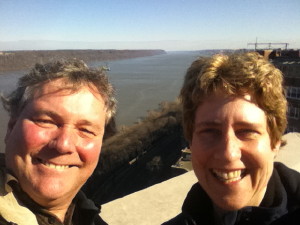
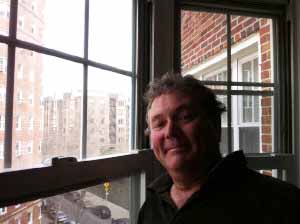
I look at it, and I wonder what I'm doing with my life. I've been so wrapped up in the big mortality play that I feel I'm losing site of some bigger picture, some activity that I could be doing to make a difference. The drugs cause me to focus inward, and not always in a good zen-like way. More like a selfish "oh me/oh my" way.
I was already thinking along these lines last week -- Mara's on her way to Uganda, Jill's dealing with some difficult environmental and radiation issues, my students and colleagues at Columbia are doing great work. Then Jill, Daniel and I went to this amazing dance performance last night at one of the mainstays of avant-garde theater in New York, La MaMa E.T.C.. Jill and I used to go there fairly often when we were younger, and she noticed an intriguing dance performance was being presented: Fall and Recover. Most of the choreography was done by the dancers in the piece, survivors of torture who had sought political asylum in Ireland. I wasn't sure what to expect. Maybe all these refugees from Uganda, Iran, Nigeria, Cameroon had developed a strong affinity for Irish clogging? Not hardly. What we saw was a really stunning performance, original in a way not "original" for contemporary dance (all dancers were obviously amateurs, they don't teach modern dance techniques in third-world prisons), but original in how movement, group-movement especially, intersected with understated but profoundly powerful human stories. It wasn't an overtly political exhibition. Instead it was really moving.
I could go into nitty-gritty details of the work, how the African communal folks songs they used (why do they always sound so happy?) wove around a disconnect in movement, how the multiplicity of different languages used created an impression of commonality and thus horror at the fact of torture, how the lone musician Rossa O Snodaigh used simple delay techniques to build a remarkable sound world. But I won't (ha ha!). If you get a chance to see these people, you should. Stay for the discussion afterwards, too.
I found a video digest of the piece on the web:
This morning Jill and Daniel and I walked down to the "Little Red Lighthouse" underneath the George Washington Bridge. The Lighthouse was the subject of a well-known children's story (no links here, look it up!). I took a few pictures just for fun:
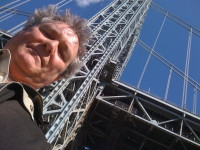
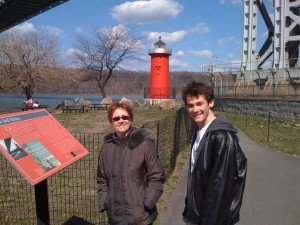
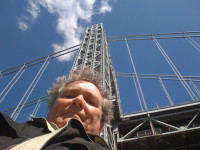
Despite my assertions above, I am doing things. In fact, tomorrow I'm heading down to Virginia Tech University for several concerts featuring some of my music and lectures about my work set up by Ico Bukvic, good friend and former student of Mara Helmuth's. It's a part of a spring festival he does in Blacksburg VA, the main link is here and a Facebook page about it here. I've also gotten confirmation from friend and collaborator Luis Jure that I'm to be one of the keynote speakers for the 2011 Latin American Audio Engineering Society Conference to be held in Montevideo, Uruguay this coming August.
Good things to do, but here's what I wish I could do:
Enough wallowing in self-pity! To turn things around, I've encountered a few examples of how things can work that slide under the greatness-inspiring model that is prevalent in our contemporary market-driven culture. Oh yeah, just a touch of self-rationalization here! The first came from a book I'm currently reading by essayist and author Mark Slouka, titled Essays from the Nick of Time. In one of the essays, Slouka writes about our sonic environment and the lack of any sense of 'silence' in the world we inhabit, especially the data-driven cell-phone, iPod, commercial-push audio activity that surrounds us. Partway through, though, he describes how he has never really encountered "perfect silence" and has this brief aside:
Perhaps someone will run across my music in this way and find a small spark of intersection that will reverberate with their own lived experience. A human connection across time or space. If that happens, then a small amount of meaning might be invested in my musical efforts. I hope so. Isn't that about the best we can achieve?
Anyhow, enough self-this and self-that for now. Yikes, maybe this is a symptom of my new drug regimen. I doubt I'm much fun to live with in this state! Time to get back to work, I have some lectures and concerts to get set.
Upon returning we had an insanely warm day yesterday. I think we
even set a record -- I checked the temperature report in
mid-afternoon and it was about 87 degrees F! Spring, summer,
they are becoming more tangible.
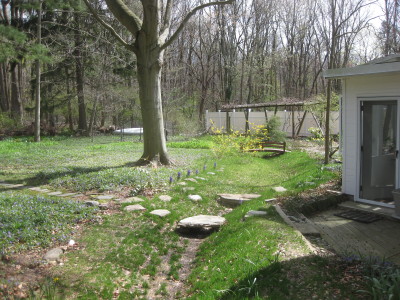
My one nod to being a decent faculty member is that I have arranged to meet a good friend of our VP for Planning at Columbia. Her friend happens to be highly-placed in the audio group at Pixar, and my hope is that we can build a strong relationship with them in conjunction with the new sound/arts program we're establishing at Columbia. Pixar is fun! I'm really looking forward to seeing the place, and who knows? Some good may come of all this.
I've always found San Francisco to be kind of scary city, though, and this is coming from a now-jaded New Yorker. This visit was no different, and in fact things seem to be a little worse. The downturn in the economy seems much more apparent here. All the stories we have heard back east about how bad things are in California seem true. Today we went down to the Fisherman's Wharf area. It was a nice day, and although there were a goodly number of San Franciscans and tourists like us about, the place seemed much less vibrant than it had in our past visits. Noticeable vacancies and boarded-up storefronts were around. Even in the famed Ghirardelli Square we saw three separate stores completely gone, leaving only empty shells. We went to a crepe restaurant that was one of Lian's favorites when she visits here to find a notice posted that it was closing "due to the bad economy" in the next week. An excellent sushi place recommended by my friend Gregory Taylor had closed. It was really depressing. It takes a lot to wreck a thriving place like this once was. Thanks, Dubya!
Probably the scariest thing (for me) was the homeless problem. I saw a vision of what New York might become again if we can't turn our economy around, and if we continue to move along the track of increasing wealth disparity. San Francisco has always seemed very much enamored of material gain, or at least the blatant display of such gain. Odd given the counter-cultural past of the city. But in any case, the flip side of the coin is that the panhandlers are very aggressive here, in a way that just doesn't happen back east. To me this is sad, and I've often wondered how to address the underlying problem that creates the context for this social scene. This time the most dismaying thing was how many homeless there were. Virtually every street corner, both in the "touristy" areas and elsewhere, had at least one sorry individual demanding money as we walked by.
I'm afraid that the current maniacal tea-party-dominated budget zeitgeist in Congress will compound this problem. I ask myself: what would I suggest to solve this human tragedy? I don't know, but cutting essential services, de-funding research necessary to find new solutions to our social ills, and increasing the differences between the haves and have-nots obviously all seem completely misguided. I can catch a wretched glimpse of a possible future here, and I am appalled at what we have allowed to happen.
Instead we wandered across the park to the de Young Art Museum. Entry was only $10/person, and the visit was a truly wonderful surprise. Because it was our first visit to the museum, we elected not to go to any of the special exhibitions (additional $$$, too) and instead wandered through their permanent collection on display. I was impressed by the curating -- some of the pieces were truly unique, especially in the African and Papua/New Guinea sections. I always suffer from a bit of "colonial vertigo" when I encounter museum displays of functional and culturally-meaningful objects from non-western societies, but the de Young collection was interesting in that they placed works by contemporary artists from these same societies along with the traditional pieces being shown. It was a kind of globalization rooted properly, somehow. Or maybe I'm just kidding myself to justify my cultural/imperialistic voyeurism.
There were three works on display, contemporary works, that weren't subject to my knee-jerk political correctness, because these were western artworks intended for display. All three were deeply moving.
The first was a piece by the artist Cornelia Parker. It was titled Anti-Mass, and upon walking into the gallery the work appeared simply as an abstract suspension of black pieces of wood in a roughly cubical shape:
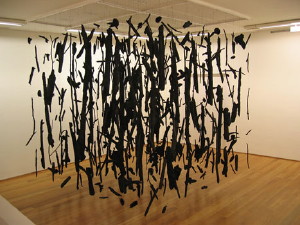
"Anti-Mass" indeed. What a powerful statement! The knowledge of this work completely changed my relation to it, how it affected me, what it meant. Yeah, I'll be using this as an example in my classes.
The next piece that really grabbed me was in the same gallery. From a distance, it seemed a remarkable model of a gothic cathedral:
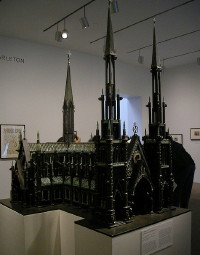
The final piece was a surprise. We can't escape Roosevelt! In one of the last galleries of contemporary art we visited hung a really interesting work by (former Rooseveltian) Ben Shahn. It was very different from a lot of the 'poster art' for which he is best known. This one was done using tempura, very colorful and detailed in a way his poster-pieces aren't. It depicted a very pathetic parade, some drooping American flags, and in a window of one of the buildings overlooking the parade route sat an obviously sad and disconnected young boy. I forgot the title of the work, but the date of realization says it: 1945. Perhaps war can be "just", perhaps war can be fought for the best humanitarian intentions (Shahn took his Jewish heritage seriously), but war is just terrible. There is no "winning" here. What is there to celebrate?
After the museum visit we found some peace in the famous Japanese Tea Garden:

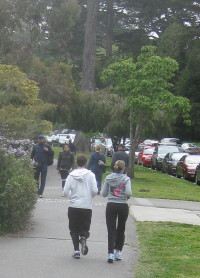
When my head-cold hadn't improved over last weekend, I was worried about the possibility of pneumonia, especially given that I was several weeks overdue with my pentamadine-inhalation. Monday I made an appointment to see my primary-care physician, Dr. Richter, and he had me do a chest x-ray. No pneumonia, just a good old chest-cold.
I went back home to rest and try to recover. Over the next few days everything just got really strange. Tuesday I drove up to Columbia for my grad seminar. Fortunately Damon was set to do the class, because I was really feeling disconnected. My cough and congestion had slightly deteriorated, but my ability to think had almost vanished. Perhaps it was because of the over-the-counter medication I was taking (nyquil- and dayquil-like cough/cold pills), but I felt like I was moving through molasses. I had to break every task down into constituent steps. I wanted a glass of milk: 1. walk into the kitchen. 2. try to remember why I was in the kitchen. 3. Open refrigerator door. 4. Identify milk container... etc. I had taken my dose of steroids on Monday, and this along with the Revlimid/Thalidomide may have muddled my thought-processes. More to come on this, though.
Fortunately I had my regularly-scheduled visit with Dr. Pearse on Wednesday morning. I managed to get through Tuesday -- thanks Damon! -- and met with him and Faiza at Weill-Cornell. My myeloma stats were still low, but they hadn't really decreased much more. Dr. Pearse said that he didn't believe we were really getting additional effects from the steroids, and he really doesn't like the long-term use of decadron. I didn't argue! He said to stop all my drugs for now until I get over my cold. When I recover, he wants me to try Velcade with Revilimid. Velcade isn't really a 'new' drug, but I haven't used it yet. It will require a once-a-week injection that can be done in Princeton, so once I'm back to "normal" I'll get things set up.
In the meantime, I had scheduled my pentamadine inhalation for Friday morning, and somehow I muddled through the rest of Wednesday and Thursday and got back to Weill-Cornell Friday morning. I was feeling so low that I had to cancel a performance-event we had set up with the Lower Manhattan Cultural Council (an event called "Sound Off" -- Luke DuBois had helped to organize it). Damon and Daniel Iglesia were the CMC-reps instead. I felt sorry letting people down, but the fact of the matter is that by Thursday night I was really feeling miserable.
I got home and have been vegetating ever since. The bizarre thing about all this is my miserable-ness isn't from a physical badness; I don't even have a fever to speak of. Instead it is like something has disconnected my brain. I would login to try to answer e-mails during the past week and it was almost as though the words made no sense. I could barely call my parents and sister to say "hello". I would drift in and out of sleep, but it didn't seem to make any real cognitive difference. The world around me was going, going, and I couldn't move. Sometimes this would make me depressed, but that required some ability to think about why I should be sad. Nothing seemed to matter. Jeez, I was just pathetic.
Still am, but I think I'm coming out of it a little now. Jill thinks
that maybe it was the combo of drugs AND then no-drugs PLUS the
inhalation therapy PLUS the cold-medication. Whatever it was, I
feel like the last week has been almost completely lost. The
past two days have been beautiful outside, or so it seems. I need
to recover now so I can be a living person again. For awhile,
at least.
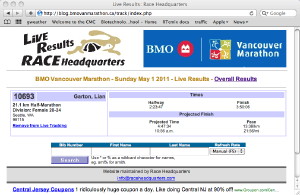
The past few days have been absolutely gorgeous. Stark blue skies, sunshine. I went to visit Terry Pender today, he now lives about an hour north of New York. Terry had his hip replaced a few weeks back. His recovery appears to be going very well.
On the way back, I came around a corner close to home, and the sun slanted from behind in a way that made everything a luminous yellow. And there was a smell coming in through the windows as I drove, a combination wood-smoke-like and earthy spring. I was listening to some slow slide-guitar music by Ken Ramm (his band Euphoria). It all seemed hyper-real for just an instant. Too few of these moments anymore. I miss them. But I don't miss the drugs.
Soon, then, I will start on Velcade, another effective anti-myeloma drug. In many cases Velcade is the 'induction therapy' used. Typically it is given with a short infusion, but Dr. Pearse would like me to try a new method of administration, a subcutaneous injection. These have to be done once a week, so I've made arrangements to have it done in Princeton at Dr. Yi's office. Dr. Yi was the first oncologist I saw after getting my myeloma diagnosis. He was also the one who recommended that I go to Weill-Cornell for treatment. He's a good guy!
Right now we're awaiting approval from my insurance company for the sub-Q approach. It's nicer because it is a single injection instead of an infusion through an IV, and it apparently has reduced side-effects. I would think the insurance company would approve, because it's also cheaper. We'll see.
Part of why I haven't written here is that I have once again fallen into the trap of thinking I should be writing Deep Thoughts. I haven't had any lately, and probably when I think I do have them they are silly. I figured I should just start writing things down again.
I do have some fun music to link here, though. Last Saturday night was my Roosevelt Arts Project presentation for the year. I use it as a chance to get the CMC staff down for a nice dinner, enjoyable sound-making. Here it is:
But I started this post with "life and death" because of events this past weekend. Friday we travelled to my sister's house in Longmeadow, MA to celebrate the high-school graduation of Stefan, my oldest nephew (photos on-line here). The dinner and following party for family and friends were spectacular -- Uncle John and (sister) Auntie Brenda never do things half-way! So much great food, and a very talented live band to promote the festivities. And my nephew Stefan, all set for college. All of the "cousins" -- Lian, Daniel, Stefan and younger brother Bo, and also JT, Katrina and Erika from John's side of their family -- they were young adults now. Erika has three lovely children, JT is a tennis pro, Lian and Daniel, oh my.
We returned on Saturday, and Sunday I attended a memorial concert for Milton Babbitt. Milton was one of my professors at Princeton. I was fortunate that his last two years before his retirement were my first two years of graduate school. I didn't really buy the view of music that Milton was selling (Paul Lansky and Jim Randall were my primary mentors at Princeton), but he was a fascinating and provocative teacher nonetheless. He died last January.
As we age, memory really does serve to telescope time. This process was unimaginable to me when younger. It has to be experienced. In my mind, the cousins are all still in elementary school, and they're preparing one of the little 'shows' they loved to put on for us at family gatherings. In my mind, I can still hear Milton's voice and see him walking up the stairs in the old Woolworth building on Princeton's campus. In my mind, my first visit here to Dr. Yi's office was just a few weeks ago. I still recall Dr. Yi saying on that late-December afternoon: "you a young guy -- live long time!" I wonder how long is long. For all of us.
Listening to one of Milton's pieces at the concert, his More Melismata (for solo cello), I worked to parse the dense musical materials, noticing particular notes that rose above the musical texture. I assume that Milton designed his music to draw attention to these specific pitch-classes; at least that's the way I can best follow how his music unfolds. After awhile I lost my musical focus and thought back upon the earlier weekend events. Why such a big party? Why bring all the family from far and wide? We stage these events to mark the occurrences in our lives, like the 'important' notes in Milton's music. We do these things to highlight the good times, the things we want to remember. In our ever-telescoping memories, they will hopefully rise above the texture of daily living and remind us of the best we can be.
I wonder if we can design our lives like music. Beyond the obvious
family/personal and professional milestones, what would I point
to in my life as "the best I can be"? I'm not sure.
All that aside, summertime is definitely here. I'm working well on some projects. I just finished three pieces I've been wrestling with for the past several months:
I am feeling optimistic, because I'm actually feeling good again. I had forgotten how nice it is simply to feel nice when I wake up. I've done two cycles of the Velcade sub-Q injections now, and no evil side-effects have shown up. I hope it is working.
I'm really glad we did! It was a wonderful time, and I think both Mom and Dad were deeply touched by the good friends who attended the reception, the dinner afterwards, and all the genuine words that were said about their service to Columbus and Indiana. I know Brenda and I both were.
We also had a chance to see friends of our parents' that we hadn't seen for years. I was surprised by how many had been reading -- and were still reading -- this silly blog. I think I'm running out of things to say! Where did all that "perspective" stuff go? My cancer is just another facet of life, no more staring-death-in-the-face insights are springing forth. All I probably have left are the platitudes we all find ourselves living with: "Life is what you make it!" "Each moment is precious!" "Carpe the diem!" You get the picture. I guess there is some truth imbedded in these now-dessicated sayings, but you probably do need to stare at death awhile to gain it. In the meantime, be sure to "Live each day to the fullest!" Yeah.
It is tempting to pull the "perspective" card when you learn of people facing cancer difficulties themselves. In the past month or so, I've unfortunately learned of several friends who have been diagnosed with various cancers, two of them receiving terrible news of bad brain tumors. Can I say to them, "I know what you're going through", because at one point in my life I thought I was going to die quickly? No, I can't. We can't know what anyone else thinks when confronting our mortal truth. How we live our lives, what we believe, what we value -- these are unique and private things, I mean the real, truthfully private things we don't share. We're all dying, and we each decide the measure of existence that will inform our death. Maybe that's what the repeated life-platitudes are intended to do, provide us with a template for determining that measurement. If so, choose them carefully.
I'll end this overblown entry with a 'perspective' story, one where getting older does indeed give a slightly broader view of life. On the way to the reception, my dad was grumbling about the event, how no one would probably show up, how silly it was to have these receptions, etc. Then my mom started saying how it would be the best retirement reception ever, how everyone would be utterly delighted to be present. My sister and I started laughing out loud. This was our childhood! Between the sometime-poles of our parents, we've managed to find our way. And we're both happy about what we've found. We then wondered how our kids would be. So far, so good!


Retirements are big time-measuring events, of course. As I mentioned above, being at Mom and Dad's reception was also an excellent opportunity for reconnecting with good family friends, people we have known for years. The unpredictable nature of life was very much in evidence, both good and bad. Unforeseen things intersect, life goes one way or another, and you look around and wonder (to paraphrase David Byrne) 'well, how did I get here?' My sister and I were so young once! We had such plans for our lives, our friend's lives!
The trick is to take where you are as it is, and then try to work from there. Quite a trick, too. The light then waxes and wanes, summer and winter solstices continue to mark our time.
There was a nice tribute to my Mom and Dad written by Harry McCawley in the Columbus paper:
Through all this, I've been thinking even more about memories, how slippery they are, how they define who we are, how we see ourselves. Maybe because they are so mutable we can live with our "past" and map an acceptable future. I've begun to sketch work for a new book-thing, based on recollections. Oh I am definitely old: "Listen ya dang young-uns, when I was young I remember..." But these days I do think much about how life has gone, how we all got here, Music helps to run the show (see my above post about the band Genesis). It's really difficult to write these things though, because the memories have a tangible nature that's almost impossible to distill into plain text. Especially difficult when you're not really a well-texted person like me. Perhaps I should stick to the music, but I want to impart a concreteness to some of the memories that music alone is too abstract to do (unless you happen to be me for these particular memories...).
Anyhow, I'll try a few things, see if any of them work. I hope so,
I'm kind of at a low point work-wise. June didn't go so well -- more
on this later.
I'm not sure this is a good thing, but at least I am aware of it. And to be honest, when something new does happen and I start in a new direction, it's great. I feel alive. But overcoming the inertia to to get to that point seems to be getting more difficult each year.
Here's an example: We had to take down a large pine tree at the front of our house. Back in the Good Ole Days, when Roosevelt was first built, the designers were convinced that oil heat was the Way of the Future. It wasn't, and our house was converted to gas heat long before we bought it. The oil tank was filled with sand, but a small amount remained in the tank and has since leaked into the ground. We are required to clean it, and the bulk of the oil percolated underneath the pine tree. Also, the tree was approaching 60 years old, and it had developed a decided lean towards our house. Maybe this wasn't a good situation.
I didn't want the tree to go! Oh my! I used to gaze at the branches against the sky while lying chemo'd-out on the couch. Never mind that we can now put in a new tree, a re-imagined landscaping. Never mind that the branches I used to watch had to be trimmed because of snow-damage in the past two years. I didn't want things to change. I want Lian and Daniel to be young forever, I want Jill to be un-jaded by the recent NJ governor horrors, I want... well, heck. Lian has grown into a beautiful young woman, Daniel is doing wonderful things in school, Jill is still the most amazing woman I know. Change. I've been cleaning my upstairs closet, going through past papers and photos. A litany of change, not bad, and here we are.
The only thing that really didn't change that I was hoping would
is my myeloma stats. I had my appointment with Dr. Pearse
yesterday, and things are unchanged. Not good, not bad. This was
based on blood-work done three weeks ago, that was only with one
cycle of the Velcade. I guess I wanted a single molecule to
destroy all my cancerous cells. Change!
before and after pine tree pictures:




Here I sit, making sounds that pretty much only I will enjoy, will hear. I write words that it seems only I am interested in reading (or perhaps a handful of others). I used to believe that what I did -- or perhaps more importantly how I did things -- would matter, would help effect some 'good' change. I think the mass of badness is far greater than I ever imagined. And I know I am far less significant than I thought I might be, back when I was in my late 20's.
Arg. Mope mope mope. It's also really hot and humid outside. I need to perhaps write more here, but what to say? What do to?
It's funny how quickly we accommodate to changes in our lives. The last time I was over to get my injection at Dr. Yi's office, it was a hot July summer day, and it seemed like I had always been doing this activity. So "normal". I could see myself doing this same trip, this same sign-in, waiting, blood test, consult with Dr. Yi, then infusion-center injection for the next however-many years. This is now my way of being.
With a disease like cancer, it's tempting to compile a litany of 'things I won't do ever again' as part of this "new normal" -- I won't be playing tennis, I won't be skiing black-diamond trails (Dr. Pearse warns that high-impact activities are not good for brittle bones), I won't be doing this or that (often thankfully so!). It's so easy to formulate your existence in the negative, and I do it often. What can I do? What will I do? These questions that now litter this blog. I need to think of answers. Or maybe not.